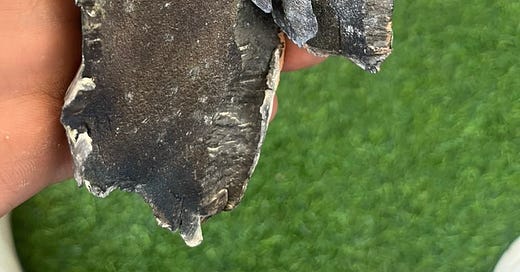'Suffering beside the innocent is the last honest thing a man can do.'
A heart-wrenching post by a Doctor working in Gaza while a genocide unfolds around him
What follows is a post from Dr. Ezzideen on X. He a doctor, still alive, in Gaza. His posts evoke the horror of life under genocide than any others I have read. Please do follow him:
I found it yesterday. A piece of shrapnel, cold and brutal, weighing no less than two kilograms, lying beside the bed of a boy no older than nine.
He slept, or perhaps only pretended. His breathing was shallow but steady, as though his soul had learned to hide from the world.
This grotesque relic of war had torn through the zinc roof above us, followed by a rain of smaller, sharper pieces.
They fell without intention, without malice, like the blind fingers of chaos fumbling across the earth, striking the just and unjust alike.
I held the thing in my hand. It was heavy. Heavier than it should be. Not by mass, but by meaning. It carried the weight of a question I can no longer answer: Why are we still alive when so many better than us are not?
There is no glory here.
No nobility in suffering.
I do not heal. How can one heal in hell? I merely bind what bleeds and pray it holds.
They call this place a clinic. But what it truly is… is a final whisper before the silence.
I will confess: I am tired. Not just in body, but in soul. I once believed in duty. In the sanctity of the Hippocratic oath. But now I find myself treating children whose bones I cannot mend, whose pain I cannot lessen. And I ask myself, with bitter honesty: Is this mercy, or is it cruelty disguised as care?
Jabalia al-Balad is no longer a city. It is a graveyard that hasn’t finished burying its dead. In three days, over forty buildings vanished as if some monstrous mouth swallowed them whole. Entire families erased. No names. No graves. No mourning. Only dust and absence.
I considered leaving. God knows I did. There was even a moment, brief but electric, when I believed I had a right to leave. But then I looked into the eyes of a mother cradling her burnt child, her lips cracked from thirst, her hands trembling not from fear, but from the weight of love. And I understood:
No one has the right to abandon the wounded when they can still stand. So I return.
Every other day, I walk into this inferno. I buy medicine with what little money strangers still send us. And I pray. Not for survival. But for clarity. For the strength to keep choosing to care in a world that punishes the caring.
Yes, I am afraid. Terribly so. Each morning I ask myself:
What right do I have to risk what remains of me?
And each morning, a darker voice answers:
What right do you have not to?
They say the healthcare system here has collapsed. That doctors are working in ruins. Yes, it is true. But even that fails to capture the madness. We work beneath falling missiles. We stitch flesh with shaking fingers while the sky groans above us. We whisper words of comfort into ears that may not live to hear them. And still, the world asks us to prove our humanity. As if we are the ones in question. But I tell you:
..our humanity is not in question. It is crucified.
And I, a doctor in Gaza, am merely one of many still clinging to the faith. Not because I believe it will save me, but because I believe that suffering beside the innocent is the last honest thing a man can do.
***





Thank you for posting this, although it is heart-breaking. How can the so-called “civilised” world allow such savagery to continue without any consequences? Why are Israeli embassies open for business as usual across Europe? Where is the United Nations? What use the Geneva Convention, the International Declaration of Human Rights and the host of other grand-sounding protocols and international laws if they cannot bring this to an end TODAY.
Dear Vanessa,
I so thank you for alerting me to Dr. Ezzedeen. . . .
Have you seen the work of Cara Marianna (https://westbankalerts.substack.com/p/missiles-overhead)? She's an American who raised the money to travel to the West Bank a year ago, fell in love with the Palestinians she met there, and is now committed to sharing on-the-ground reports from them. As with Dr. Ezzedeen, the reporting is heart-rending and personal, while the brutality described is beyond belief.
Blessings to you for your reporting, your knowledge of the region, and your analysis (if such a thing is even possible) of the madness we're all complicit in . . . even from a distance.